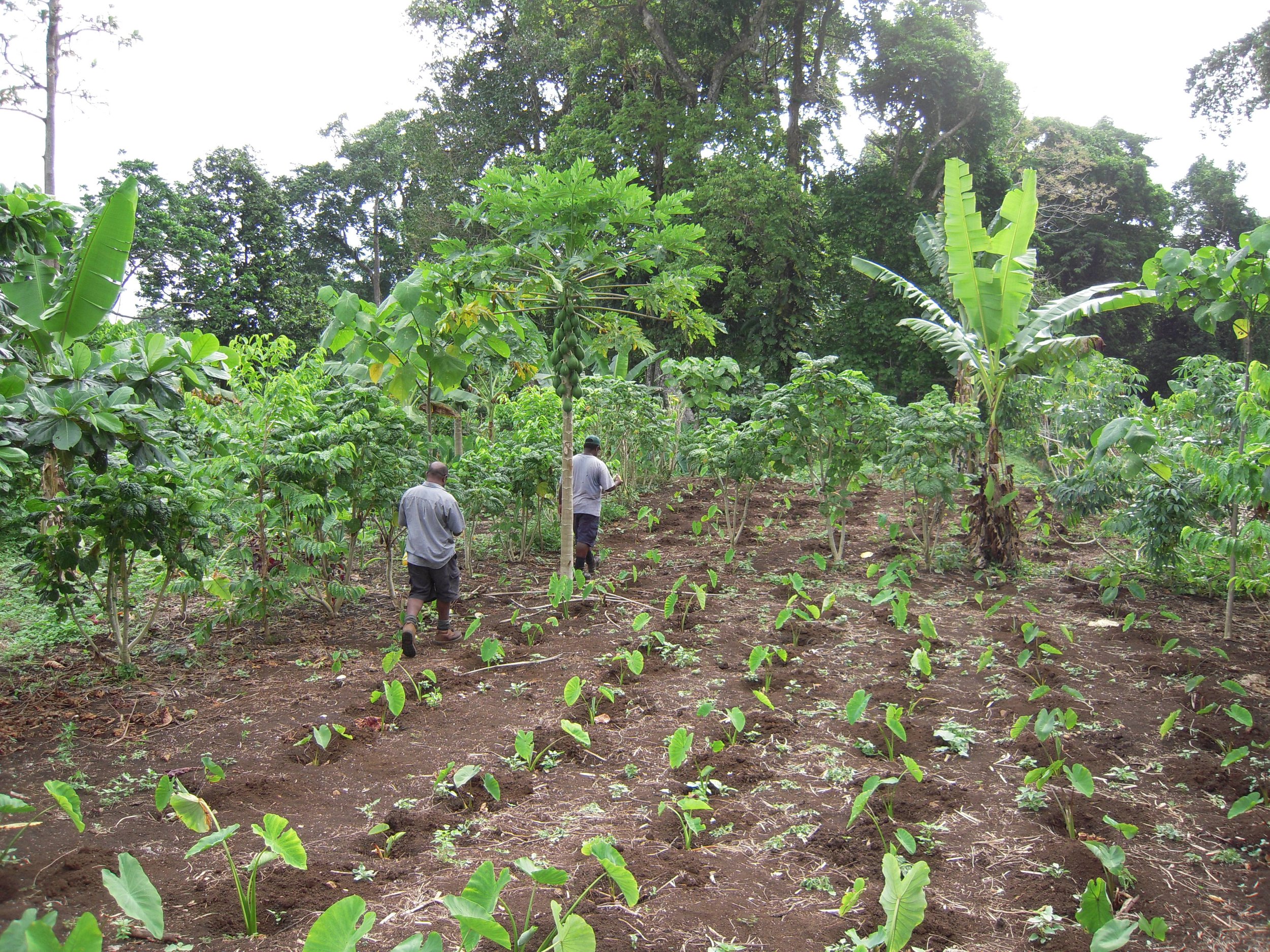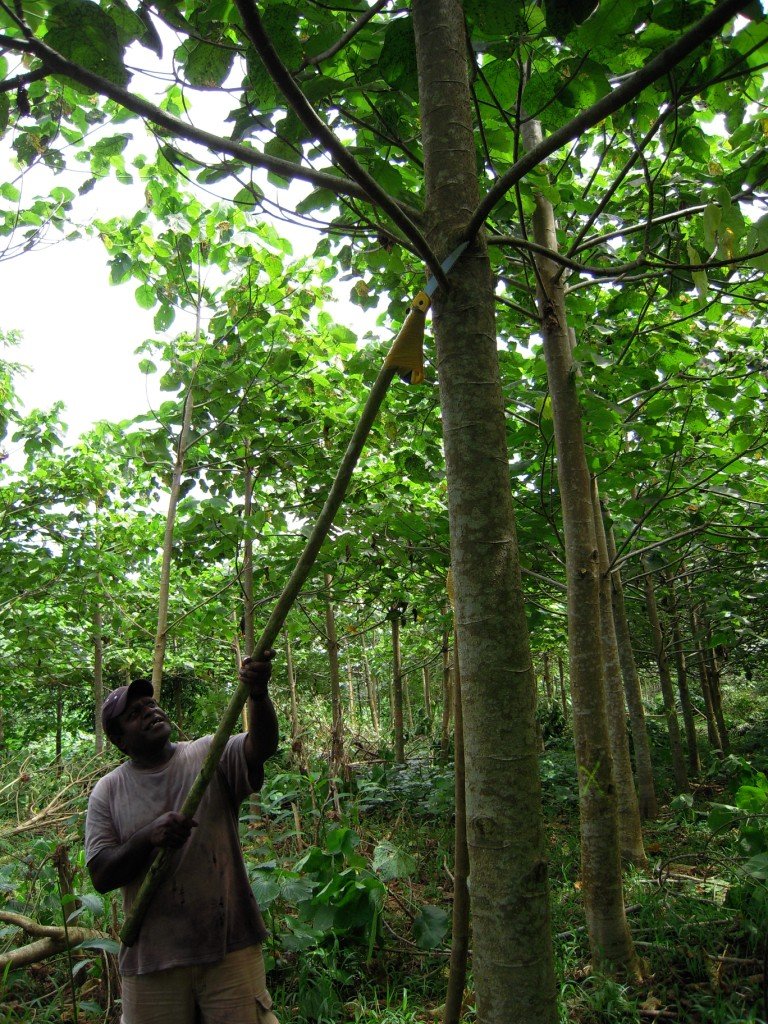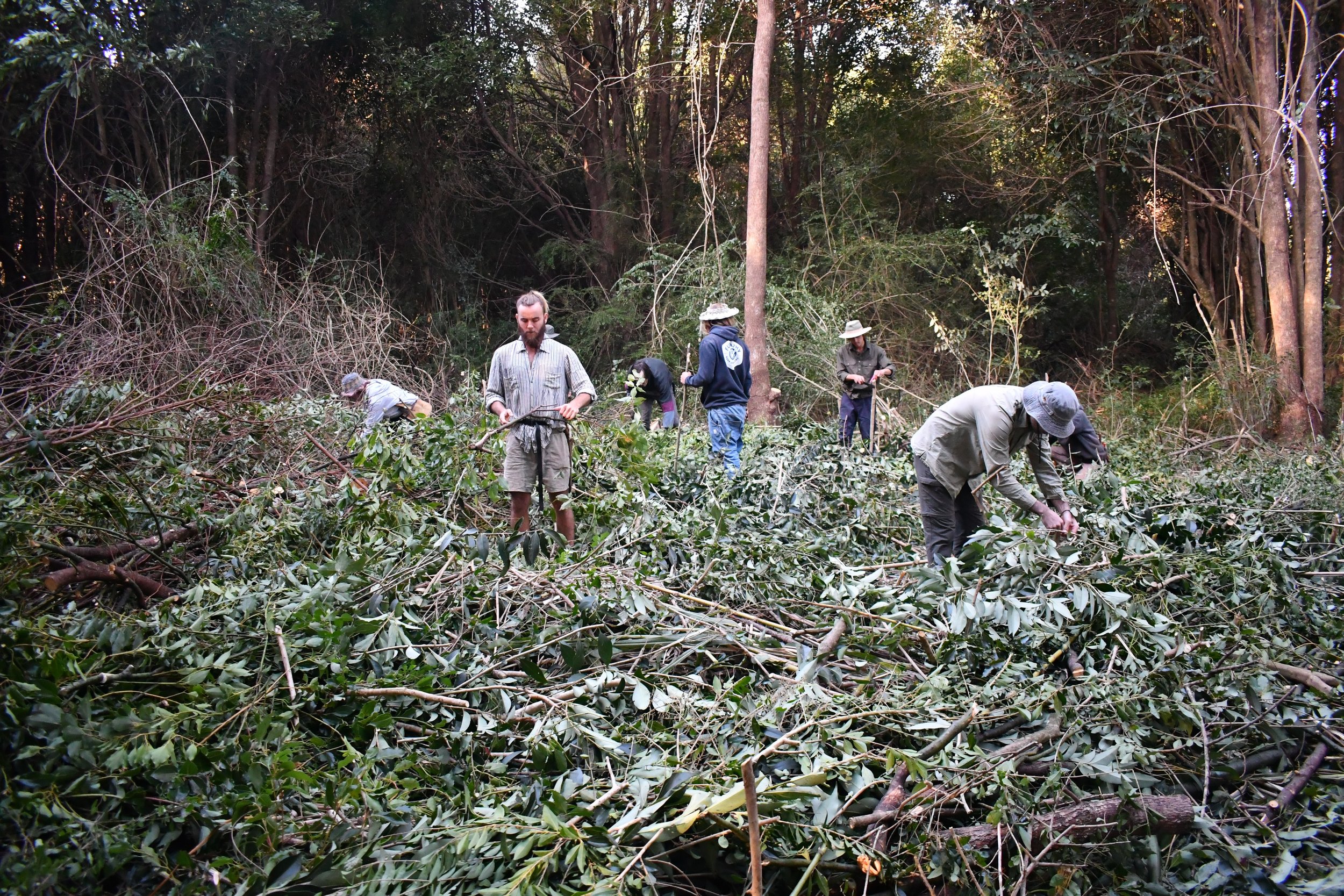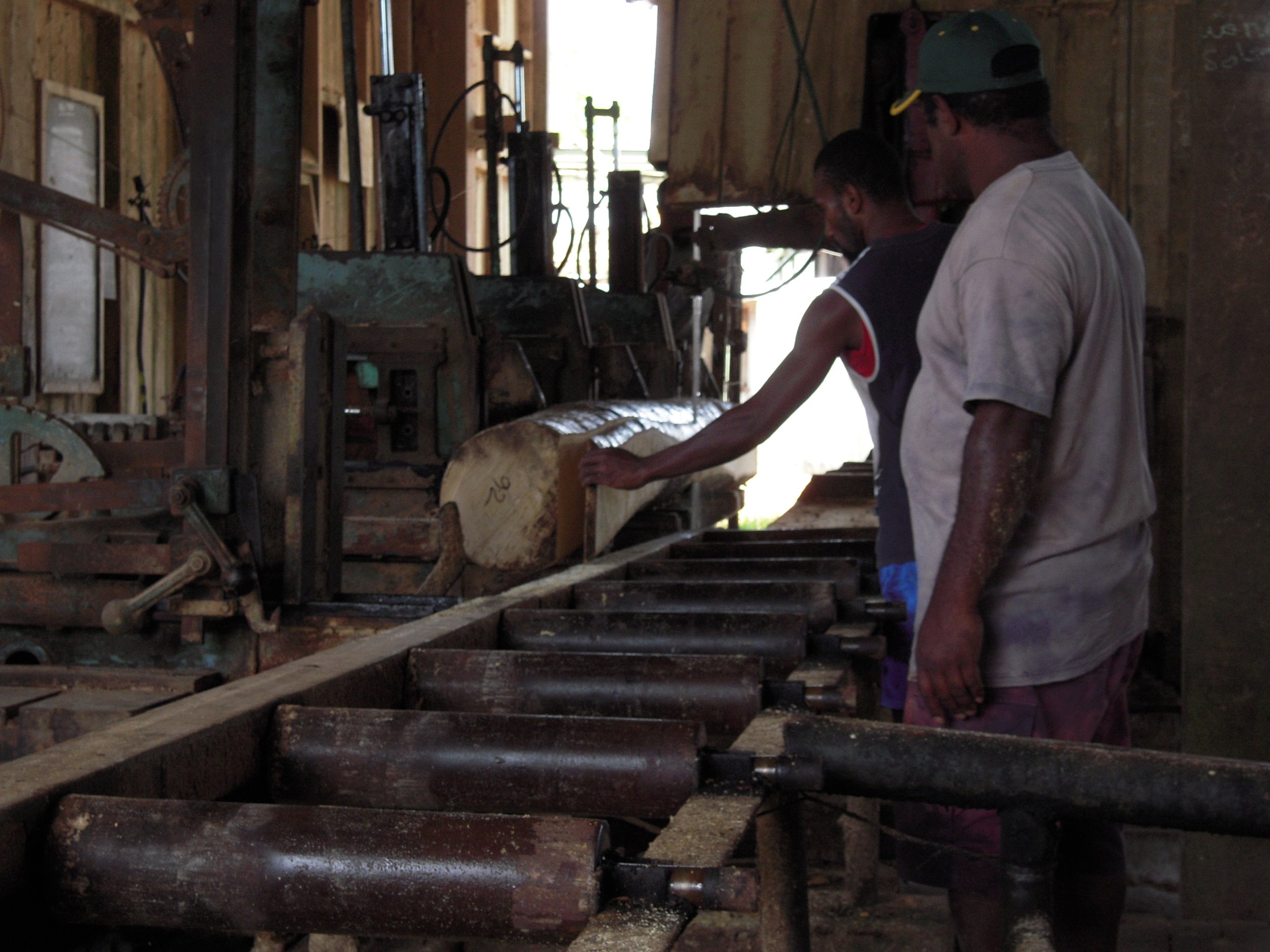










Dynamic Agroforestry - Advanced Succession Agroforestry Management - Dates TBA
This course specifically focuses upon the management, design and evolution of food forests and agroforestry systems in 1-5 year stage of development – with some practical work also in later stage forest management of established camphor forest to establish diverse native rainforest regeneration with an enrichment of bush tukka species for food production and economic return.
This course is designed for more advanced students of Food Forestry seeking the opportunity to work within and manage established forest systems integrating learnings from Agroecology/Agroforestry/Permaculture/Syntropic/Bush Regeneration/Indigenous Land Management. The learning will primarily be through working and sharing together on projects driven by Forest Succession in and around the Northern Rivers Region of NSW. The purpose is to work in multiple sites at different stages of development within different soil types and microclimates to appreciate the broader context and nuances of food forestry in our bioregion.
Suited to: Practicing Students of Permaculture/Syntropic Farming/Agroecology that are seeking detailed guidance with management techniques and plant patterning in subtropical production systems.
Topics covered:
Evolving food forests from simple, linear systems to complex, dynamic, diverse, organic form forest ecologies
Exploring and managing specific guilds/consortiums of multi-strata food forest plant species including local Bush Tukka Plants
Composing and managing forest structure for the needs of specific crops/livestock with respect to nuance of site characteristics and production/management goals
Identifying, creating and refining microclimates
Advanced species selection and guild creation in our bioregion
Evolution of banana and biomass tree management in advanced stages of succession
Introduction of later succession species into established agroforestry systems
Edible Fungi Cultivation in Forest Systems
Design and Management of production systems for frost protection
Cultivation and food preparation of a range of hardy perennial and bush tukka crops
Participants in this course will need to be familiar and competent with the use of hand saws, secateurs and machetes and will need each of these tools with them at all times of the course. The course will include demonstrations of felling large trees with the use of a chainsaw. You will not be using chainsaws yourself in this course.
Participants are required to have completed a ‘Living Agroecology’ course with us. You must be competent at utilising the ‘Strata/Lifecycle Analysis’ planning table for design and management of mutli-strata agroforestry systems. Some foundational knowledge of Permaculture ‘Zoning’ Principles will be useful also.
About the facilitators:
· Bunya Halasz is inspired by cultures that evolve creative practices of sustaining their material needs in a manner of deep reverence for their natural environment and all of its life forms. Through the lenses of Permaculture, Regenerative Agroecology and Successional Agroforestry, Bunya works as a designer, educator and gardening mentor. His work supports individuals and communities to grow food, fuel and fibre within ecologically regenerative systems as well as facilitating pathways of knowledge and skill sharing through courses and traineeships.
· Flavia Renata Assuncao is a children’s educator with a Degree in Pedagogy from Federal University of Sao Carlos, Brazil. She has been working in Schools with Permaculture Concepts creating composts, organic vegetable gardens as well as recycling and social economy programmes with children since 2002 in both Brazil and Australia. She is a passionate writer and photographer with an eye for detail and a beautiful curiosity of the natural world
Other Special Guest facilitators
Investment - $895 - early bird price of $845 avail until TBA
The Primary Venue for this course is our Living Classroom at ‘The Farm’ at Byron Bay with a couple of field trips to ‘Namabunda Farm’, Alstonville and another venue – more details shared upon enrolment
For more information contact:
Bunya - growingrootsgarden@gmail.com
This course specifically focuses upon the management, design and evolution of food forests and agroforestry systems in 1-5 year stage of development – with some practical work also in later stage forest management of established camphor forest to establish diverse native rainforest regeneration with an enrichment of bush tukka species for food production and economic return.
This course is designed for more advanced students of Food Forestry seeking the opportunity to work within and manage established forest systems integrating learnings from Agroecology/Agroforestry/Permaculture/Syntropic/Bush Regeneration/Indigenous Land Management. The learning will primarily be through working and sharing together on projects driven by Forest Succession in and around the Northern Rivers Region of NSW. The purpose is to work in multiple sites at different stages of development within different soil types and microclimates to appreciate the broader context and nuances of food forestry in our bioregion.
Suited to: Practicing Students of Permaculture/Syntropic Farming/Agroecology that are seeking detailed guidance with management techniques and plant patterning in subtropical production systems.
Topics covered:
Evolving food forests from simple, linear systems to complex, dynamic, diverse, organic form forest ecologies
Exploring and managing specific guilds/consortiums of multi-strata food forest plant species including local Bush Tukka Plants
Composing and managing forest structure for the needs of specific crops/livestock with respect to nuance of site characteristics and production/management goals
Identifying, creating and refining microclimates
Advanced species selection and guild creation in our bioregion
Evolution of banana and biomass tree management in advanced stages of succession
Introduction of later succession species into established agroforestry systems
Edible Fungi Cultivation in Forest Systems
Design and Management of production systems for frost protection
Cultivation and food preparation of a range of hardy perennial and bush tukka crops
Participants in this course will need to be familiar and competent with the use of hand saws, secateurs and machetes and will need each of these tools with them at all times of the course. The course will include demonstrations of felling large trees with the use of a chainsaw. You will not be using chainsaws yourself in this course.
Participants are required to have completed a ‘Living Agroecology’ course with us. You must be competent at utilising the ‘Strata/Lifecycle Analysis’ planning table for design and management of mutli-strata agroforestry systems. Some foundational knowledge of Permaculture ‘Zoning’ Principles will be useful also.
About the facilitators:
· Bunya Halasz is inspired by cultures that evolve creative practices of sustaining their material needs in a manner of deep reverence for their natural environment and all of its life forms. Through the lenses of Permaculture, Regenerative Agroecology and Successional Agroforestry, Bunya works as a designer, educator and gardening mentor. His work supports individuals and communities to grow food, fuel and fibre within ecologically regenerative systems as well as facilitating pathways of knowledge and skill sharing through courses and traineeships.
· Flavia Renata Assuncao is a children’s educator with a Degree in Pedagogy from Federal University of Sao Carlos, Brazil. She has been working in Schools with Permaculture Concepts creating composts, organic vegetable gardens as well as recycling and social economy programmes with children since 2002 in both Brazil and Australia. She is a passionate writer and photographer with an eye for detail and a beautiful curiosity of the natural world
Other Special Guest facilitators
Investment - $895 - early bird price of $845 avail until TBA
The Primary Venue for this course is our Living Classroom at ‘The Farm’ at Byron Bay with a couple of field trips to ‘Namabunda Farm’, Alstonville and another venue – more details shared upon enrolment
For more information contact:
Bunya - growingrootsgarden@gmail.com

